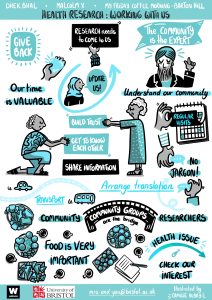Three stages to building reciprocal relationships with community groups: the CHICO guidance
- 18 September 2023
Three key stages to help researchers involve racially marginalised community groups more effectively in their work are explained in a new paper published in Research Involvement and Engagement. The co-produced guidance, which focuses on building reciprocal relationships with communities, is the result of the ‘Checklist for inclusive community involvement in health research’ study, or CHICO for short.
Catherine Jameson and Vikki Wylde, who are researchers from the NIHR Bristol BRC, worked closely with three community groups:
- Dhek Bhal is a group for the South Asian community in Bristol and South Gloucestershire
- My Friday Coffee Morning—Barton Hill brings together women resident in Barton Hill, Bristol, which has a large Somali population
- Malcolm X Elders, a group for older Afro Caribbean people in St Paul’s, Bristol

The guidance was co-produced through initial meetings to introduce the project and build relationships with community leaders, followed by three in-depth meetings with each group. The stages they identified are:
- Building relationships – This stage is about building trust with the community, rather than researchers ‘parachuting’ in to get input for a project then never returning
- Reciprocal relationships – This stage should be an ongoing and iterative process to understand how best to build and maintain reciprocal relationships and give back to the group
- Practicalities – This part is about the practicalities of developing and running inclusive community group involvement activities, especially understanding what would work best for a particular community group
The CHICO team also produced an illustration (shown above) to help bring their guidance to life.
Catherine was awarded the Values in Practice award at the University of Bristol STAR awards for this work on 14 September.
Zehra Haq, CEO of Dhek Bhal, said:
“The illustration is a useful tool in recognising the importance of service users’ participation in consultations, particularly those from diverse and marginalised communities.
“The emphasis on acknowledging the commitment given by service users to participate as well as sharing feedback and outcomes by university researchers as part of the process, highlights their value as partners.
“We are thankful to Catherine Jameson for offering us the opportunity to be involved in the production of the illustration, which we have included in our most recent annual report and calendar for 2023, to raise awareness with others of important considerations that need to be made when carrying out consultations. It is not something that should be put away on a shelf, but should form the basis for any future consultations!”
Catherine Jameson, Senior Research Associate and Patient and Public Involvement Co-ordinator at the University of Bristol, said:
“I know how many approaches from researchers our partner groups get all the time, so I would like to thank them for working with us on this guidance.
“We are advocating for fair and reciprocal relationships between community groups and researchers. We hope that this work will help community groups and researchers work together on topics that are of interest to community group members, enabling previously marginalised groups to feel that they are active and valued partners in health research.
“We would love to talk to anyone who is thinking about doing this!”
The CHICO study was made possible by funding from the Elizabeth Blackwell Institute and was supported by NIHR Bristol BRC.
If you are interested in using the CHICO guidance in your research, contact Catherine on cdcmj@bristol.ac.uk.
